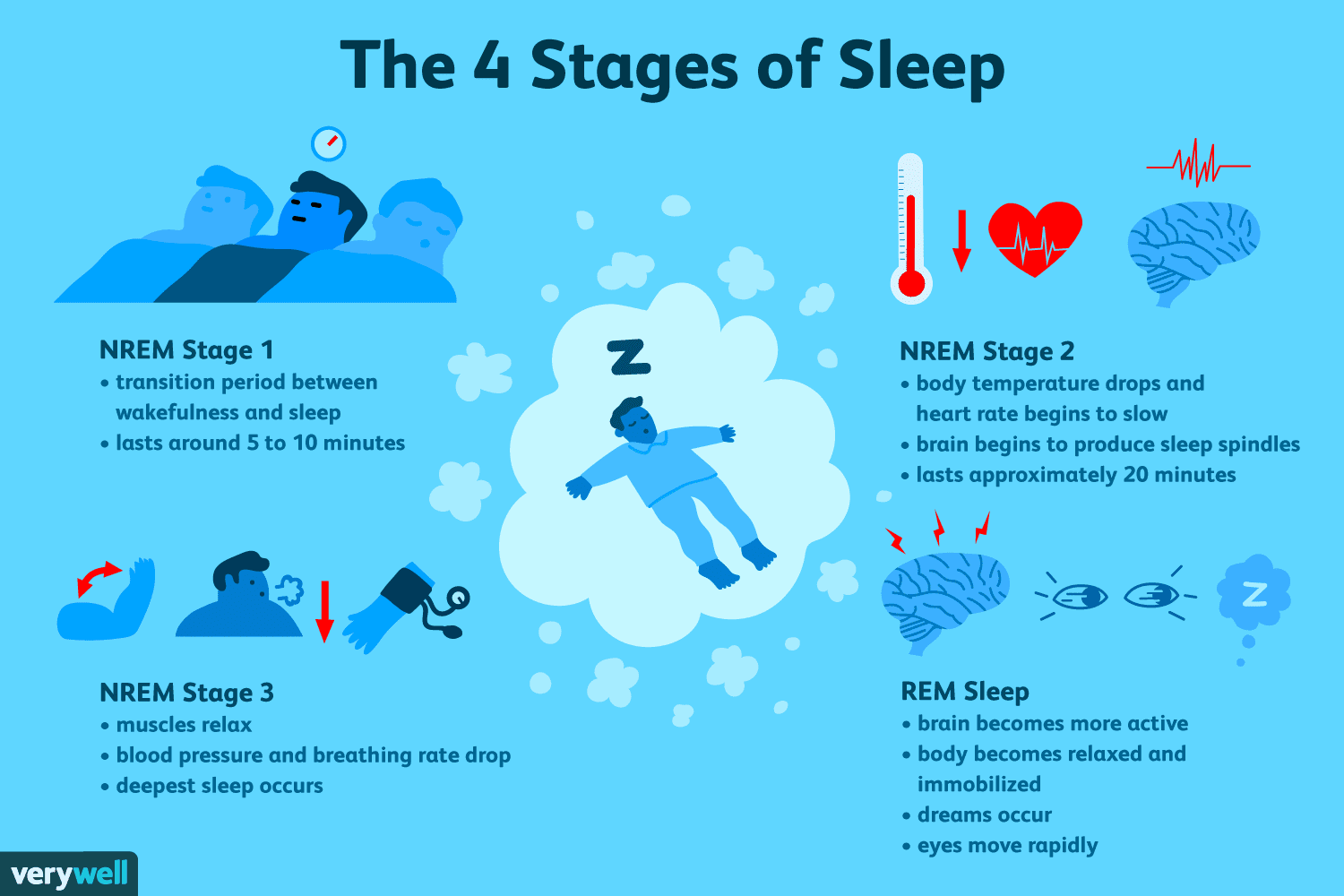What Happens To Your Brain When You Sleep? [The 4 Stages of Sleeping]
Sleep is an integral part of everyone's lives, however the function, stages, and benefits of sleep have been somewhat mysterious to scientists for thousands of years.
Most people assume that when they go to sleep everything shuts down and life for them comes to a standstill. Well, it does, to an extent, since the five senses do in a way switch off and the outside world becomes a blurry, distant memory. Your brain, however, still maintains a level of activity even when you get some shut-eye.
Sleep is a psychological and physiological state that your whole being cooperates with. Your nervous system reduces its reaction to external stimuli and your brain wave activity changes significantly. This goes hand in hand with your body getting the chance to heal itself from the accumulated wear and tear that you pick up throughout the day.
Sleep isn’t just passive for your brain; it’s very active and accomplishing more things than just resting. It is a state where the brain and body recuperate in different ways that help you get the most out of this period. To understand exactly what happens to your brain when you sleep we will have to look at sleep itself.
The 4 Stages of Sleep- NREM Vs. REM
When you sleep it occurs in stages or phases that follow a pattern that can be traced from brain activity, these stages are either classified as NREM (Non-Rapid Eye Movement) or REM (Rapid Eye Movement). Sleep Stages 1-3 are NREM Sleep, with only Stage 4 being classified as REM Sleep. This means you go through a sleep journey during these times. These sleeping stages occur in cycles and repeat throughout the time you are asleep.

1. Light Sleep Phase
If you nod off during a meeting or in class when the lecture becomes a bit fuzzier than you remember, then you are in the light sleep phase. A slight reduction of consciousness is what happens to your brain when you sleep during this cycle.
Your state of wakefulness is a little bit compromised but an outside signal such as someone calling your name or a slight tap ought to wake you up. Your brain can still process some information around you, it’s just with a lot less clarity. You easily drift in and out of sleep and you can remember fragmented images when you become fully awake.
2. Intermediate Light Sleep
This phase is what follows the light sleep stage if conditions become more comfortable. The transition fades the external world a bit more for your brain, making it a lot harder to notice your surroundings.
What happens to your brain when you sleep during this cycle is that its waves become slower. There are, however, occasional bursts of rapid waves that punctuate the sleep cycle.
It becomes harder to wake up from this stage because your brain has entered a different rhythm in its wave state.
3. Deep Wave Sleep
At this stage of sleep, your brain has an even slower rhythm of waves and a deeper loss of awareness of your external world ensues. These waves, called delta waves, begin to appear and are interspersed with sporadic faster waves.
This is the stage that has the most restorative effect on what happens to your brain when you sleep. You also get the most benefits of restfulness during this stage. It is a lot harder to wake someone up from deep wave sleep and if you do so they will end up feeling dazed. You also have a hard time adjusting immediately once woken up from deep wave sleep.
4. REM Sleep
Finally, we have the dream state or the rapid eye movement sleep phase. What happens to your brain when you sleep at this point is that you begin to dream. Your breathing becomes a bit more rapid while your eyes find an equally quick movement with an increase in heart rate.
Your limb muscles also become partially paralyzed during the REM sleep phase. On a typical night, one drifts from light to intermittent to REM sleep phases. As the night progresses the length of REM sleep periods increases while the deep sleep phase periods become shorter.
You also lose the ability to regulate your body temperature during this stage. Extreme hot or cold in the environment will, therefore, affect this stage of your sleep. If your REM sleep is interrupted even for a night it will affect your whole sleep cycle.
The Benefits & Advantages of Sleeping
Sleep has enormous benefits for both the body and mind. There are some people who might view it as just a useless state of inactivity but this is not the case. If you are keen on wellness, sleep should have the same consideration as eating right and exercising.
Sleep does more than just help you recharge. It gives your body that flood of precious moments to rejuvenate and rest while your brain does a myriad of things. Your brain literally rewires itself in a process that helps it to retain new information that you picked up during the day.
So if you are a student pulling an "all-nighter" on the evening of an exam, this activity isn't actually going to help much. Your brain needs to process and incorporate those new signals from the information. This can only happen when you are asleep.
What happens to your brain when you sleep is that it maps the information and forms new pathways while breaking apart old ones. This helps in learning and gives you that boost needed to face the new day. It is no wonder we all get cranky when we are sleep deprived.
Missing that much-needed shut-eye makes you lose your focus and concentration. We have all experienced at a point in our busy lives. You need sleep to maintain a healthy and proactive life. Sleep deprivation also accumulates and leads to a reduction in the quality of life, simply because your brain becomes overworked.
Get a great night's sleep by seeing out best pillow lists, and finding the right pillow for you!
Research also shows that a good night’s sleep helps regulate your mood, reduces stress, improves libido, and assists with memory and learning. Chronic insomnia, which is prolonged stages of sleep deprivation has been linked to anxiety and depression. It is recommended that one gets an average of eight hour’s of sleep, but this varies from person to person.
It is important for both your body and brain that you get the quality and quantity of sleep you need. What happens to your brain when you sleep is clearly adding up to your overall well-being and productivity, and we are only just beginning to understand the implications of this. So make it one of your good habits to catch those ZZZ’s every night!

Hello! My name is James, a researcher of pillows and getting a great night’s sleep with over 10 years of experience! Graduate of the University of Kansas with a Physiology Degree. I enjoy writing, camping, reading, traveling abroad, swimming, and educational research. Contact me at the social links below!

![What Happens To Your Brain When You Sleep? [The 4 Stages of Sleeping] Your Brain And Sleeping](https://www.pilesofpillows.com/wp-content/uploads/2019/11/brain.jpg)